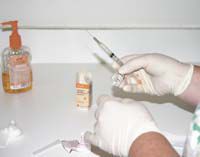| Hepatitis B vaccinations are just one of many vaccinations available and necessary for elementary through high school students. Keeping ahead on immunizations can benefit students and prevent them from catching and spreading dangerous and even fatal diseases. Not only are they important to the health of students they are also required by law in the state of Utah in order to go to school. |
As the beginning of the school year looms in Carbon County, parents are reminded that immunization time is here as well.
Proof of immunization is a requirement for attendance at any school, Head Start or child care facility in Carbon County and throughout Utah.
However, an exemption may be granted for children who have medical, religious or personal reasons against vaccinations. Specific established criteria must be met for children to qualify for the exemptions.
Immunizations are an effective tool to prevent many diseases, point out state and national public health agencies.
There are 12 potentially serious diseases that vaccines protect against, according to state and national public health agencies.
The diseases include measles, mumps, rubella (German measles), diphtheria, tetanus (lock jaw), pertussis (whooping cough), polio, haemophilus influenzae type B (Hib disease), hepatitis B, varicella (chickenpox), hepatitis A and pneumococcal disease.
At least one shot is needed for each of the diseases and some require several doses for the best protection.
Several combination vaccines exist like MMR and DTaP. Multiple vaccines are given in a single shot.
More combinations are being developed and, in the future, fewer shots will be needed for the same number of vaccines.
Even though progress has been made to eliminate many vaccine preventable illnesses, the diseases still exist and can be fatal, especially to young children.
It is necessary to vaccinate at an early age because the diseases can strike young victims at an early age, emphasize the state and national health agencies.
The ages recommended for vaccination give children the earliest and best protection against the disease.
Some of the potentially deadly diseases are more serious and common among infants or young children.
Up to 60 percent of severe disease caused by haemophilus influenzae type B occurs in children younger than 12 months of age.
Infants less than 6 months of age are at the highest risk for serious complications of pertussis.
Nearly 72 percent of children younger than 6 months who get pertussis must be hospitalized. And 84 percent of all deaths from pertussis are among children younger than 6 months.
According to the Utah Department of Health’s immunization program, Carbon County students born before July 1, 1986 are required to have four DTP/DT, three polio, two measles, one mumps and one rubella vaccination.
Students born after July 1, 1986 are required to have five DTP/DTaP/DT or four if the fourth dose was given on or after the child’s fourth birthday, three OPV (oral polio) or four IPV (inactivated polio), two measles and one mumps vaccination.
Children born after July 1, 1993 are required to have five DTP/DTaP/DT or four doses if the fourth was given on or after the fourth birthday, four polio or three doses if the third was given on or after the fourth birthday, two measles, one mumps, one rubella and three hepatitis B.
Students born after July 1, 1996 are required to have five DTP/DTaP/DT or four if the fourth was given on or after the fourth birthday, four polio or three if the third dose was given on or after the fourth birthday, two measles, one mumps, one rubella and three hepatitis B vaccinations.
Also required for kindergarten entry is the hepatitis A and varicella or chickenpox vaccine. A parent is allowed to sign a verification statement to avoid the varicella vaccination if the child has already had chickenpox.
Children enrolled in early childhood programs including day care, preschool or Head Start are required to have their diphtheria, tetanus, pertussis, polio, measles, mumps, rubella and haemophilus influenzae type B vaccinations. Children attending early childhood programs are also required to be immunized appropriately according to their age.
Immunizations can be obtained from the Utah Department of Health.

